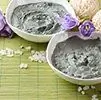Table of contents:
- Treatment of bronchial asthma with folk remedies at home
- Herbal medicine: benefit or harm?
- Traditional methods of treating bronchial asthma
- Treatment of bronchial asthma with herbs
- Treatment of bronchial asthma with beekeeping products
- Video
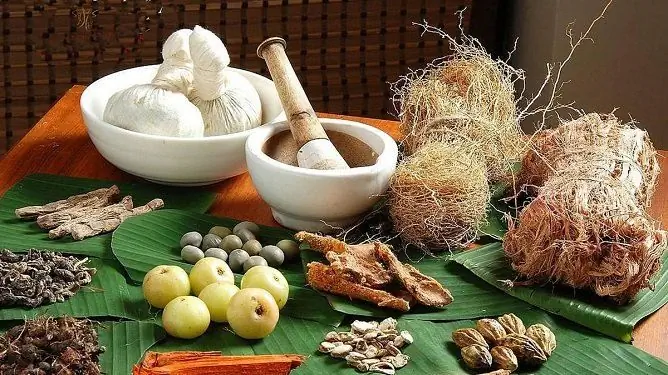
Video: Treatment Of Bronchial Asthma With Folk Remedies In Adults And Children

2024 Author: Rachel Wainwright | [email protected]. Last modified: 2023-12-15 07:39
Treatment of bronchial asthma with folk remedies at home
The content of the article:
- Herbal medicine: benefit or harm?
- Traditional methods of treating bronchial asthma
-
Treatment of bronchial asthma with herbs
- Pine cones
- Aloe Vera Healing Balm
- Garlic oil
- Ginger for bronchial asthma
- Kalina from bronchial asthma
- Essential oils
- Treatment of bronchial asthma with beekeeping products
- Video
Folk remedies for bronchial asthma are very popular, but is this approach justified?
Bronchial asthma is a chronic disease of the respiratory system, which is manifested by recurrent bouts of labored noisy breathing, dry cough. Modern medicine has a number of drugs that allow you to control the course of the disease well and ensure a stable remission is achieved. But many people believe that it is much safer to be treated with "herbs" rather than "chemistry." Let's try to figure out if they are right.
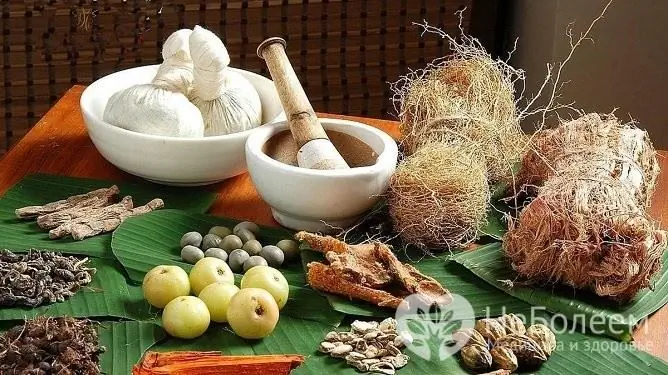
Is it true that folk remedies, in contrast to pharmaceutical "chemistry", are completely safe?
Herbal medicine: benefit or harm?
Treatment of bronchial asthma with folk remedies at home is quite acceptable, but only if the following conditions are met:
- traditional methods should complement drug treatment, and not replace it;
- before starting treatment, you must consult with your doctor and obtain his consent.
Patients should understand that herbal medicine and other alternative methods are not a panacea and are not without drawbacks. Experts, on the contrary, emphasize that phytopreparations for bronchial asthma are potentially dangerous. The fact is that any medicinal plant contains many biologically active substances, and it is not known what effect each of them can have on the human body, since such studies have not been carried out.
The composition of pharmacological preparations is precisely known and constant, but the composition of plants is unstable. It is largely determined by environmental conditions (presence of pollution, climate, chemical composition of water and soil). In fact, various unknown and sometimes toxic impurities can be included in the composition of plants.
It is not a guarantee of the safety of herbal medicines and a long history of their use. For example, the herb aristolochia (kirkazon) was widely used in China as a medicine for bronchial asthma, tuberculosis and hypertension. Several years ago dietary supplements with aristolochia were actively sold in Western Europe. But scientific research has shown that this seemingly harmless herb is fraught with a huge danger to human health. Long-term use of it leads to irreversible damage to the kidney tissue and contributes to the development of malignant tumors in the upper third of the urinary tract.
The concentration of active substances in medicinal plants is insignificant, much lower than in pharmaceutical preparations, therefore, one should not expect a quick and lasting effect from them.
At the same time, you should not completely abandon the use of alternative methods for bronchial asthma. Many of them are quite effective and their application has a scientific basis, but they can be used only on the advice of a doctor and as part of a complex therapy of the disease. It is unacceptable to completely replace drug therapy with folk remedies, as this threatens the development of serious complications.
Traditional methods of treating bronchial asthma
In this article, we will not consider such exotic folk remedies as, for example, ingestion of ammonia or hydrogen peroxide. They are not only completely ineffective, but can also cause poisoning, burns of mucous membranes and, ultimately, deterioration of the patient's condition.
Let's talk about herbal medicine for bronchial asthma and the use of bee products.
Treatment of bronchial asthma with herbs
Herbal medicine of bronchial asthma should be aimed at eliminating the main factors that provide the mechanism for the development of bronchial obstruction. For this purpose, medicinal plants are used that have a pronounced anti-inflammatory, antispasmodic and anti-allergic effect. They can be applied both individually and as a fee.
Pine cones
An infusion of pine cones gives a good effect not only for bronchial asthma, but also for inflammatory diseases of the respiratory tract (pharyngitis, bronchitis). To prepare the infusion, you need to take 2 green pine cones and rinse them thoroughly under running water. The cones are placed in a thermos, a small piece (no more than 2 cm in diameter) of pine resin is added to them and poured with half a liter of boiling milk. Insist 4 hours. Then filter and take one glass twice a day. The course of treatment is 4–8 weeks. If necessary, it can be repeated after a short break.
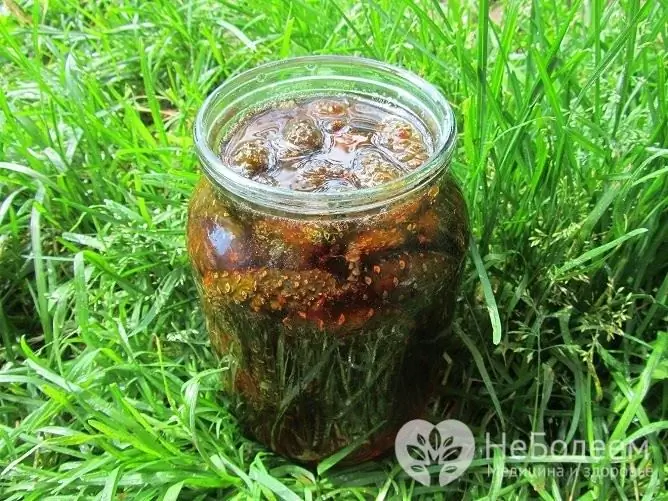
Pine cone infusion can be effective for respiratory tract inflammation
Aloe Vera Healing Balm
Balm recipe:
- aloe leaves - 250 gr.;
- honey - 350 gr.;
- wine (quality Cahors wine) - 0.5 l.
Before cutting the leaves, aloe is not watered for 10-15 days. The collected leaves are wiped from dust with a slightly damp cloth. Then they are broken into small pieces and placed in a liter jar, poured over with wine and honey. Stir until the honey is completely dissolved and leave in the refrigerator for 15 days. After that, strain the mixture through several layers of gauze, squeezing the leaves.
In the first two days, take a tablespoon 3 times a day. Then the dose is reduced to a teaspoon 3 times a day.
This product is intended for adults only. Since the composition of the medicinal balm includes alcohol, its use in children is strictly prohibited!
Garlic oil
You can treat bronchial asthma, bronchitis, ARVI with the help of garlic, which has a pronounced bactericidal effect. To prepare garlic oil, you need to take 100 g of softened butter and add 5 finely chopped cloves of garlic to it, salt a little to taste. Store the resulting mixture in the refrigerator and use it like regular butter (use for making sandwiches, add to mashed potatoes). Garlic oil has a pleasant taste and aroma; not only adults, but also children eat it with pleasure.
Ginger for bronchial asthma
It has long been known that ginger has an immunomodulatory and bactericidal effect. Therefore, its use has a beneficial effect on the course of respiratory diseases, reduces the risk of complications. Recently, in the course of a scientific study conducted by employees of the University of Columbia, it was found that ginger also has bronchodilatory properties, that is, it is able to relax the smooth muscles of the bronchi. In case of bronchial asthma, the use of ginger in conjunction with traditional medicines allows you to interrupt an attack of suffocation in a short time.
Peel and rinse a small piece of ginger root under running water, grate on the finest grater and squeeze the juice. Then mix one teaspoon of ginger and lemon juice, add half a teaspoon of honey or sugar to this mixture. Pour half a glass of boiling water and cool. The medicine is taken during an attack of suffocation, a teaspoon every 30 minutes until such symptoms of bronchial asthma as shortness of breath and dry cough disappear.
Kalina from bronchial asthma
Quite an effective remedy for bronchial asthma is a decoction of viburnum. To prepare it, you need to mash one tablespoon of ripe berries in puree and pour a glass of warm boiled water. Let it brew for 10-15 minutes, then bring to a boil and simmer under a closed lid over low heat for 20 minutes. Cool, drain. Top up with boiled water to its original volume and add a teaspoon of honey. The resulting broth should be drunk in small sips throughout the day.
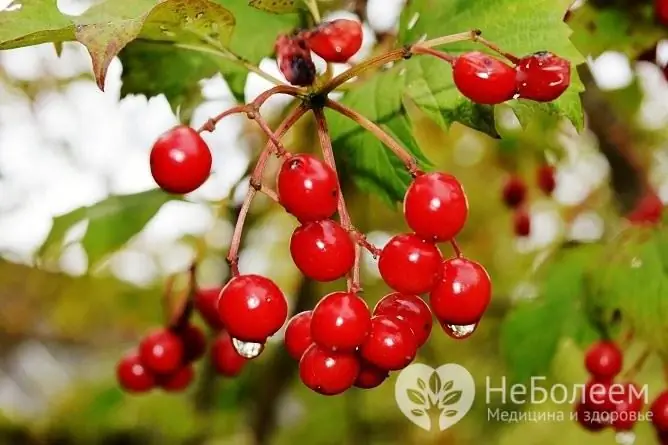
To prepare a decoction of viburnum, take ripe berries
Essential oils
Traditional medicine recommends the use of a number of essential oils for the treatment of bronchial asthma:
- peppermint oil - inhibits the release of histamine by cells, improves nasal breathing;
- lavender oil - has anti-inflammatory and sedative effects;
- eucalyptus oil - has an antiseptic effect;
- tea tree oil - has anti-inflammatory and anti-allergic effects.
Any of these oils are used for steam inhalation. To do this, it is necessary to heat ½ liter of water to a temperature of 55-60 ° C and add 2-3 drops of essential oil to it. Breathe, bending over the pan and covered with a towel for 10-12 minutes. Such steam inhalations can be repeated 2-3 times during the day. They should be done no earlier than 1.5-2 hours after eating. This method of treatment is not used in children.
It should be understood that the rationale for the effectiveness of essential oils is purely theoretical and not supported by the results of clinical studies.
Treatment of bronchial asthma with beekeeping products
Traditional medicine widely recommends the use of beekeeping products (honey, royal jelly, pollen, propolis) in the treatment of bronchial asthma. However, it must be remembered that all these products are strong allergens and in some patients can provoke an attack of suffocation. Therefore, before starting treatment with honey or propolis, you should definitely consult your doctor. It is also important to consider that no more than 50 g of honey can be consumed per day. In severe bronchial asthma, apitherapy is contraindicated.
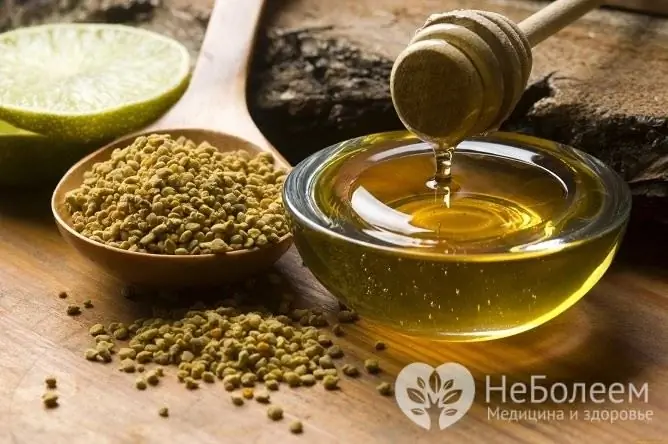
Beekeeping products for bronchial asthma are used with caution, as they are allergens
The most popular honey remedies used for bronchial asthma are:
- Honey balm. Mix in equal proportions by volume honey, lemon juice, aloe juice, cranberry juice, onion juice, black radish juice, 96 ° ethyl alcohol and sugar. The container with the mixture is stored in the refrigerator, periodically shaking until the sugar is completely dissolved. Take 3 times a day half an hour before meals, 2 tablespoons. This remedy is contraindicated for children. The course of treatment is 1 month.
- Alcohol tincture of propolis. To prepare it, you should take 80 g of propolis and place it in the refrigerator for 2-3 hours. Then grate and cover with cold water. After 5 minutes, the water is decanted and the resulting precipitate is dried. The propolis prepared in this way is placed in a dark glass bottle and filled with 300 ml of 70 ° ethyl alcohol. Cork tightly and infuse at room temperature for 15 days, periodically shaking vigorously. The finished tincture is filtered through several layers of gauze and stored in a dark place. Adults take 20 drops of tincture 3 times a day, after dissolving it in a small amount of warm boiled water or milk.
- A mixture of honey and royal jelly. Mix honey with royal jelly in a ratio of 100: 2. Adults are advised to take 1 teaspoon 2 times a day half an hour before meals. The mixture should be kept in the mouth until completely dissolved. In children, the dosage is age-specific and should be adjusted by a physician.
In conclusion, I would like to emphasize once again that folk remedies for asthma will never replace the traditional treatment for this serious disease. They can be used as part of complex therapy and only after consultation with the attending physician.
Video
We offer for viewing a video on the topic of the article.

Elena Minkina Doctor anesthesiologist-resuscitator About the author
Education: graduated from the Tashkent State Medical Institute, specializing in general medicine in 1991. Repeatedly passed refresher courses.
Work experience: anesthesiologist-resuscitator of the city maternity complex, resuscitator of the hemodialysis department.
Found a mistake in the text? Select it and press Ctrl + Enter.
Recommended:
Bronchial Asthma: Symptoms And Treatment In Adults At Home
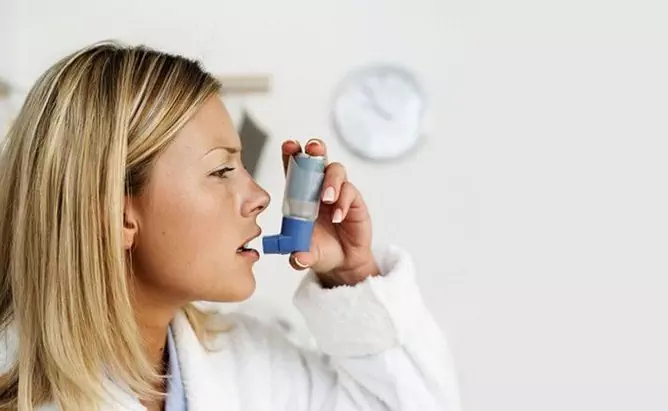
Bronchial asthma is a chronic disease caused by a non-infectious inflammatory process in the bronchi. Manifested by attacks of choking, coughing
Treatment Of Pharyngitis With Folk Remedies In Adults And Children: Methods, Recipes
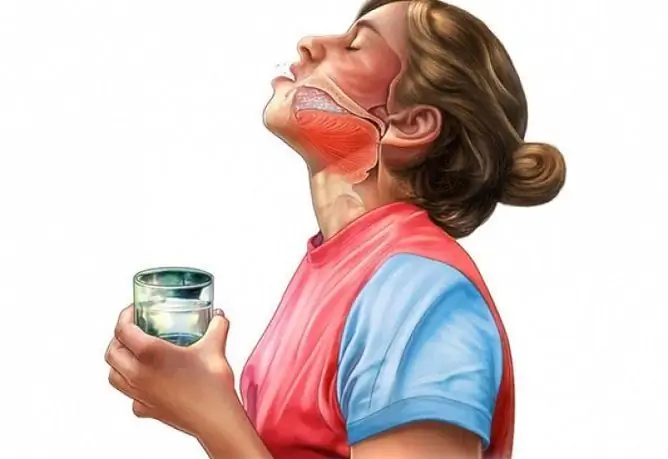
Treatment of pharyngitis with folk remedies contributes to the rapid elimination of the symptoms of the disease. The main methods are rinsing and inhalation
Rhinitis: Treatment In Children And Adults, How To Cure Folk Remedies

Rhinitis is a condition characterized by inflammation of the nasal mucosa and manifested by difficulty breathing. With inadequate treatment, complications develop
Prevention Of Bronchial Asthma In Adults And Children: A Memo
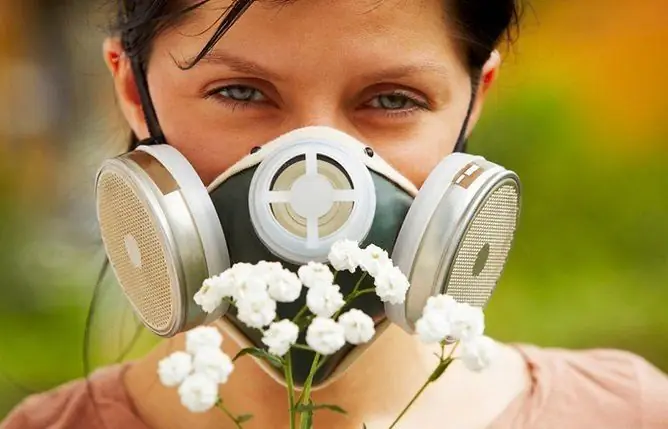
Prevention of bronchial asthma is divided into primary, secondary and tertiary, it is aimed at preventing the development of this disease and its complications
Treatment Of Angina With Folk Remedies In Adults And Children
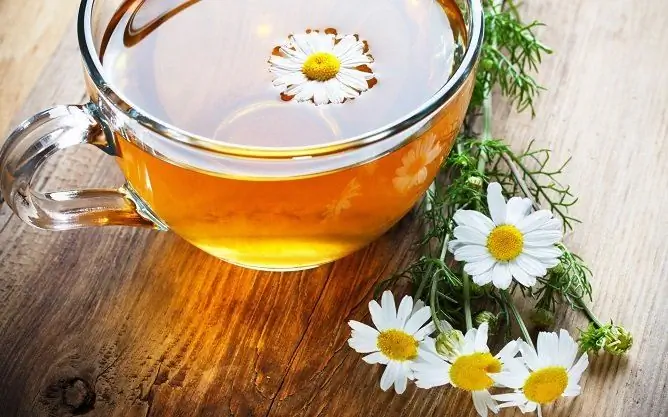
Treatment of angina with folk remedies in children and adults can be carried out at home, most often - in addition to drug therapy



